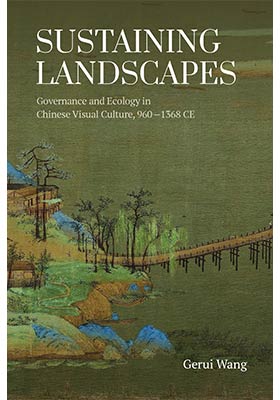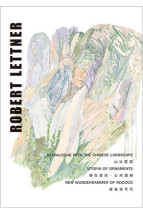Sustaining Landscapes
Governance and Ecology in Chinese Visual Culture, 960–1368 CE
ISBN : 978-988-8876-93-8
November 2025
220 pages, 7″ x 10″, 127 color illus.
- HK$395.00
Ebooks
Sustaining Landscapes: Governance and Ecology
in Chinese Visual Culture, 960–1368 CE examines ecological
thought contested amid the rise of the Chinese landscape genre, tracing its
intersections with infrastructure governance, natural resource management, and
geospatial knowledge. It traces the pre-industrial notion of “sustainability”
in policy debates, legal regulations, and arts. Landscape imagery on paintings,
maps, as well as mass-produced artifacts such as fans and ceramic pillows documented
both appropriate and exploitative use of natural resources, and critiqued on social
inequity and political turmoil. This book breaks new ground by bringing together
research on visual and material culture with analysis of politics and ecology. Wang
argues that the Chinese landscape genre embodied a holistic approach to negotiating
debates on
human-nature interdependence and people-state relationships. It joins the increasing
literature on ecocriticism and offers alternative perspectives to address contemporary
challenges, ranging from environmental crisis to global governance.
“How to manage the trade-off between short term economic gain and long term environmental sustainability? It seems like a modern question. Surprisingly, it was debated with great insight by thinkers in Chinese history. Even more surprising, it was expressed in subtle ways in Song-Yuan period landscape imagery. Read this fascinating and beautifully illustrated book to find out more!”
—Daniel A. Bell, author of Why Ancient Chinese Political Thought Matters
“Gerui Wang’s provocative study provides a valuable new perspective on representations of landscape in the tenth through fourteenth centuries. She uncovers unmistakable signs of what we today would call environmental consciousness in artistic and cartographic illustrations of many kinds, reflecting policy debates on natural resource management, and the inequitable social consequences of nature’s exploitation and degradation. This book is a contribution both to art history and the history of ecological thought and action in China. It will change the way we look at these ‘contested landscapes’.”
—Ronald Egan, Stanford University
“This insightful work demonstrates vividly the relevance of China’s rich historical experience for humanity’s most pressing challenge today. Thanks to engaging prose, county memos and painted pillows bring to life the yeoman’s struggles or heated capital debates, revealing what was truly at stake in humanity’s early attempts to legislate sustainable use of natural resources.”
—Martin Powers, University of Michigan/Peking University
“Drawing on diverse evidence from Song and Yuan-era policy debates, administrative maps, poems and dramas, and landscapes painted on scrolls, fans and ceramic pillows, Gerui Wang’s study reveals the widespread concern with environmental resource and human sustenance as a field of productive tension across imaginary, social, and political arenas.”
—Richard Vinograd, Stanford University
“This groundbreaking book unearths a treasure trove of ecological wisdom and practices in classical Chinese landscape painting. Through the lens of art history and environmentalism, Gerui Wang sheds a refreshing light on how art engages social order and economic production while maintaining intimate communion with nature.”
—Ban Wang, Stanford University







